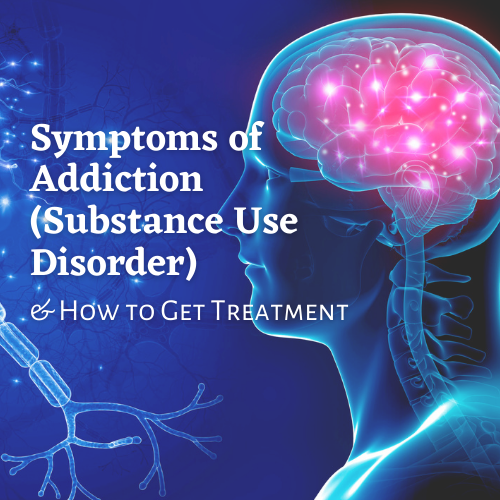
Symptoms of Addiction (Substance Use Disorder) & How to Get Treatment
What are the symptoms of addiction (substance use disorder) and how can a person receive treatment? Addiction (substance use disorder) is a disease that affects a person’s behavior and brain and leads to the inability to control the use of a legal or illegal drug, medication or alcohol.
Statistics
According to a 2018 survey reported by SAMHSA, over 60% of those 12 or older used a substance within the past month. Additionally of those surveyed nearly 140 million Americans used alcohol the past month and 1 in 5 used an illicit drug in the past year. This is higher than in previous years and continues to grow. Aside from Marijuana, prescription pain reliever was the most common substance misused. In 2018, 3.6% of the US population reported misusing pain relievers. More than half of the people were misusing pain relievers from a friend or relative. Similarly, this survey had a separate category for opioid misuse. They defined it as the use of heroin or the misuse of prescription pain relievers. An estimated 10.3 million people aged 12 and older misused opioids or heroin.
Symptoms of addiction (substance use disorder)
The most common and early signs of addiction (substance use disorder) are extreme mood changes, pupils seeming smaller or larger than usual, difficulty cutting down or controlling the need to use, drastic changes in sleep habits and unusual changes in energy.
Mechanism of substance use disorder
Substance use disorders are a mental, neurological based disorder. This is because there are adverse effects and changes with brain development and function. Most drugs function in the reward centers of the brain. This triggers neurotransmitters like dopamine or serotonin. Prolonged usage can cause the development of tolerance when the receptors in the brain becoming adjusted to the same dose(s). Individuals who misuse substances earlier than their mid-20s have a higher chance of developing a substance use disorder later in life. This is because the brain is still developing into an individual’s 20s.
Co-occurrence with other mental health disorders
Substance use disorders often co-occur with mental health disorders. Those who misuse substances have a higher chance of developing a mental disorder and vice versa. For example, 45% of those who sought treatment for substance use disorder in the past year were diagnosed with a co-existing mental health disorder. It is important to be screened for any co-occurring disorders to ensure you have a complete plan for recovery.
How to get help
Everyone’s recovery journey is unique. Once out of treatment it’s important to work with your counselor on next steps because it allows the individual to stay on target with their recovery goals.
Here at Lifeline Connections, we offer all of these things with our substance use treatment services and recovery community. Additionally our compassionate counselors are a phone call away to help you start your recovery journey. Call (360) 397-8246 ext. 30500 to schedule an admit appointment.
